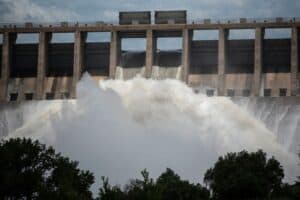Agriculture sector concerned about another El Niño event amid blackouts.

There is a high probability for the return of the El Niño weather system in the upcoming summer season, which combined with the ongoing national load shedding crisis, doesn’t bode well for South Africa’s agriculture sector.
In contrast to the wet weather conditions associated with the La Niña phenomenon which several parts of the country had experienced over the last rainfall season, South Africans should brace themselves for very hot conditions, according to the South African Weather Service (SAWS).
This is due to the expected El Niño phenomenon, which is usually associated with a series of heatwaves.
South Africa experienced several severe El Niño events in the past decade, which also led to extreme drought, with levels at some of the dams dipping to critical lows, with the Vaal Dam reaching levels as low as 26%.
Despite the heavy rainfall that was experienced in the last summer rainfall season, several water experts warned that unless urgent attention is given to issues of infrastructure, a lot of rain would have little impact on water security in various parts of the country, where taps have already been running dry.
ALSO READ: SA’s water crisis 20 years in the making
Forecasts look very worrying
According to long term forecaster at the SAWS Dr Christien Engelbrecht, there is a high chance for El Niño to form, with the latest weather predictions being worrying particularly for those in the agriculture sector.
The SA Canegrowers say while an end to the heavy rainfall that has caused flooding for two successive seasons may seem positive, the opposite extreme carries risks for growers too.
“South Africa’s sugar industry suffered significantly during the last El Niño, and we expect that this one too will bring its own challenges and yet this time around the effects may be even more significant on account of load shedding.
ALSO READ: Stage 6 load shedding: Here’s how we got here
“The intermittency of the electricity supply has already been a challenge for growers who farm irrigated cane and who need sustained electricity to power their irrigation operations. In the event of a drought, irrigation will become even more important, making load shedding a greater threat,” the SA Canegrowers’ CEO Thomas Funke told The Citizen.
ALSO READ: Eskom’s electricity supply has been declining since 2008
El Niño likely to make things worse
He stressed that any losses on account of El Niño will exacerbate an already difficult climate for growers who are still battling high input costs, the impact of the Health Promotion Levy on industry revenue, the damage caused by the floods, and the crisis currently gripping the milling industry.
“SA Canegrowers, therefore, urge all growers to prepare in advance for the additional resources required to sustain operations through El Niño and this is especially important for the growers whose irrigation systems were damaged by the floods earlier this year.
“We will make every effort to provide the information and support growers need to adequately prepare for the expected challenges as El Niño sets in,” said Funke.
He said growers will also require support from government.
“Importantly, steps must be taken to accommodate the needs of the agricultural sector in the implementation of load shedding so as to enable proper irrigation during the coming dry season.
“This could be in the form of farming areas being exempt from power outages or being load shed at night (so irrigation can happen during the day) as well as tax incentives to invest in alternative power sources,” Funke added.
Effects of previous drought
Agri SA says while the previous drought was arguably one of the worst occurrences the country had experienced, they are very worried about what’s expected in the upcoming summer season.
“The Kouga Dam in the Eastern Cape was below a staggering 3%, with only 30% of farmers in the Northern Cape still able to continue farming, while vineyards and orchards were completely destroyed, leaving farmers bankrupt with thousands of job losses.
“Drought does not only affect a farmer and its workers, but also the rural economy of that district (towns, schools, grocers),” Agri SA’s risk and disaster manager Andrea Campher told The Citizen.
She said while farmers can’t anticipate or really prepare for a drought, they trust that they have learned lessons from the previous drought cycle.
Campher said they have implemented risk reduction practices and will adapt to harsher weather conditions to be more resilient while not comprising production.
Likely impact of El Niño
The energy crisis has placed irrigation farmers under severe pressure where heatwaves impacted field crops earlier this year.
“While the need for water equipment such as irrigation pumps and boreholes is great during droughts and heatwaves, it will be required that this equipment be fully operational as load shedding can have a further negative impact on the operation of the equipment in question to enable farmers to produce good yields,” Campher said.






